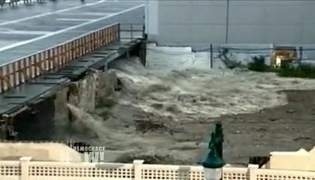
Related
Guests
- Solomon Hsianglead author of a study linking civil wars with global climate change. He is a postdoctoral researcher at the Woodrow Wilson School of Public and International Affairs at Princeton University. The research for the study on civil wars and climate change was conducted while he was at Columbia University.
A new study has found that that often war is associated with global climate change. According to the report, there are links between the climate phenomenon El Niño and outbreaks of violence in countries from southern Sudan to Indonesia and Peru. The scientists find that El Niño, which brings hot and dry conditions to tropical nations, doubles the risk of civil war in up to 90 countries, and may help account for a fifth of conflicts worldwide during the past 50 years. We speak with the report’s lead author, Solomon Hsiang, a postdoctoral researcher at the Woodrow Wilson School of Public and International Affairs at Princeton University. [includes rush transcript]
Transcript
AMY GOODMAN: We move to another issue around climate. A new study has found that war is associated with global climate. According to the report, there are links between the climate phenomenon El Niño and outbreaks of violence in countries from southern Sudan to Indonesia and Peru. In fact, the scientists find that El Niño, which brings hot and dry conditions to tropical nations, doubles the risk of civil war in up to 90 countries. The study was published online last week in the journal Nature. El Niño may help account for a fifth of conflicts worldwide during the past 50 years.
We’re joined by Solomon Hsiang, a lead author of the study linking civil wars with climate change, postdoctoral researcher at the Woodrow Wilson School of Public and International Affairs at Princeton University.
Welcome to Democracy Now! Explain what you found, in these last few minutes.
SOLOMON HSIANG: So what we did is we looked at data since 1950, and we looked at how the global climate fluctuated between a cooler and wetter La Niña state and a higher and drier El Niño state. And what we found is that when the global climate was in the cooler and wetter La Niña state, the risk of conflict in the tropics was about three percent per year. So what that means is, if you had a hundred countries, you would expect about three of them to begin a new civil war in any given year. But when you move to the hotter and drier El Niño state, the risk of conflict rises to six percent, which is a doubling.
AMY GOODMAN: And a little backing up, El Niño, explain exactly what it is.
SOLOMON HSIANG: Sorry. So, El Niño is a change in the global climate that originates in the Pacific Ocean. So under normal conditions, there’s winds that push warm water across the Pacific Ocean and basically pile it up around Indonesia. But in some years, that wind pattern breaks down, and that water sloshes all the way across the ocean, across the equatorial Pacific, and releases a tremendous amount of thermal energy into the atmosphere. And that creates an enormous wave that propagates through the atmosphere around the tropics, leading to warmer and drier conditions throughout most of the tropics and subtropics.
AMY GOODMAN: Do you see the U.S. being impacted by El Niño in this way that you’re describing?
SOLOMON HSIANG: So, actually, in our study—there are generally observable impacts of El Niño in the United States. But in our study, the impacts were not large enough to merit inclusion in the group of countries that we denoted as being highly impacted by El Niño. So, in the tropics, the effect of El Niño is actually much more dramatic than what we observe in the United States.
AMY GOODMAN: What were you most surprised by in this study?
SOLOMON HSIANG: So, we were actually most startled by the magnitude of the effect. The idea that El Niño could affect one-fifth of conflicts around the world startled us, and it was completely unexpected.
AMY GOODMAN: Give an example.
SOLOMON HSIANG: So, you know, we have—it’s very difficult to pin down a particular conflict as being related to El Niño. In general, I think the way to think about it is that the global climate is a contributing factor to ongoing existing conflicts. But there are many countries in the sample that look particularly conspicuous, because they begin conflicts in El Niño years.
AMY GOODMAN: Like?
SOLOMON HSIANG: For example, Peru, Sudan, Chad, Indonesia, Myanmar, these are all countries that have experienced conflicts that seem to be highly correlated with this process.
AMY GOODMAN: We’re going to link to your study at democracynow.org. Solomon Hsiang is our guest, the lead author of a study linking civil wars with global climate change, postdoctoral student at the Woodrow Wilson School of Public and International Affairs at Princeton University.












Media Options